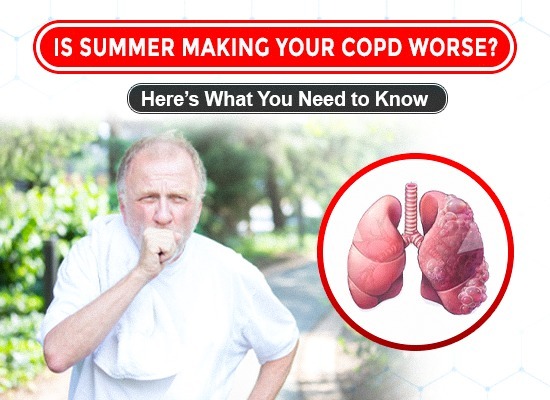Is Summer Making Your COPD Worse? Here’s What You Need to Know
Why Do COPD Symptoms Worsen in Summer?
Although winter is commonly associated with breathing problems, summer brings its own triggers for people with chronic respiratory conditions. Here’s why the warmer months may affect COPD more than expected:
1. Excessive Heat and Humidity
When the weather is hot and humid, it can make the air feel thick and heavy. This puts extra pressure on the lungs, especially in individuals already struggling with airflow obstruction, leading to shortness of breath and fatigue.

2. Pollution and Ozone
Warmer weather can contribute to higher levels of pollution. Sunlight reacts with pollutants to form ground-level ozone, a common irritant for people with lung diseases. Increased vehicle emissions and dust in the air can also worsen COPD symptoms.
3. Risk of Dehydration
The body loses more fluids in the summer due to sweating. Dehydration can cause mucus in the lungs to become thick and sticky, making it difficult to clear the airways and leading to coughing and wheezing.
4. Seasonal Allergens
Pollens, dust, and other airborne allergens continue to circulate in summer. These can act as triggers for respiratory issues, particularly for people who have both COPD and allergic conditions like asthma.
Common Signs of a Summer Flare-Up
- Feeling unusually short of breath
- A noticeable increase in coughing or mucus
- Changes in the color or thickness of mucus
- Wheezing or tightness in the chest
- Swollen legs or ankles
- Fatigue or trouble sleeping due to breathing discomfort
Helpful Tips to Stay Comfortable During Summer
1. Stay Indoors During Peak Heat
Try to limit outdoor activities between 10 AM and 4 PM when the sun is at its strongest. If you must step outside, wear light clothing and carry your inhaler with you.
2. Stay Hydrated
Make sure to drink enough water throughout the day. Proper hydration keeps mucus thin, helping your lungs function more efficiently. Avoid alcohol and caffeine as they can dehydrate you.
3. Keep Track of Air Quality
Check the Air Quality Index (AQI) using weather apps or local updates. Poor air quality can make breathing more difficult, so it’s best to stay indoors on days when pollution is high.
4. Stick to Your Medications
Never skip your prescribed treatments. Take your inhalers and medications on time, and make sure you have an emergency inhaler with you at all times.
5. Eat Light and Balanced Meals
Large meals can press against your diaphragm and make breathing more difficult. Eat smaller meals throughout the day and focus on fruits, vegetables, and foods rich in healthy fats.
6. Avoid Strenuous Activities
Physical exertion during the heat can increase breathlessness. Choose gentle indoor exercises like stretching or light yoga and avoid overexerting yourself.
7. Wear Mask
You should wear a mask or scarf on high pollution or high allergen days.
When to Seek Medical Help
- Experience extreme shortness of breath, even while resting
- Notice a bluish tint to lips or nails
- Have trouble speaking full sentences
- Feel dizzy, confused, or extremely tired
- See blood in your mucus
- Have a high fever along with breathing problems
Comprehensive COPD Care at Mukat Hospital, Chandigarh
Mukat Hospital offers complete care for patients with chronic respiratory issues. Our Pulmonology Department is staffed with experienced doctors and trained support teams to ensure you get the best possible treatment.
Our services include:
- Detailed lung assessments including spirometry
- Tailored COPD management plans
- Pulmonary rehabilitation and breathing therapy
- Emergency care for acute episodes
- Oxygen therapy and nebulization support
Why Mukat Hospital is the Right Choice
- Expert pulmonologists with years of experience
- Round-the-clock ICU and emergency facilities
- Patient-focused care in a clean, comfortable environment
- Located conveniently in the heart of Chandigarh (Sector 34A)
- Compassionate staff and personalized treatment approach












